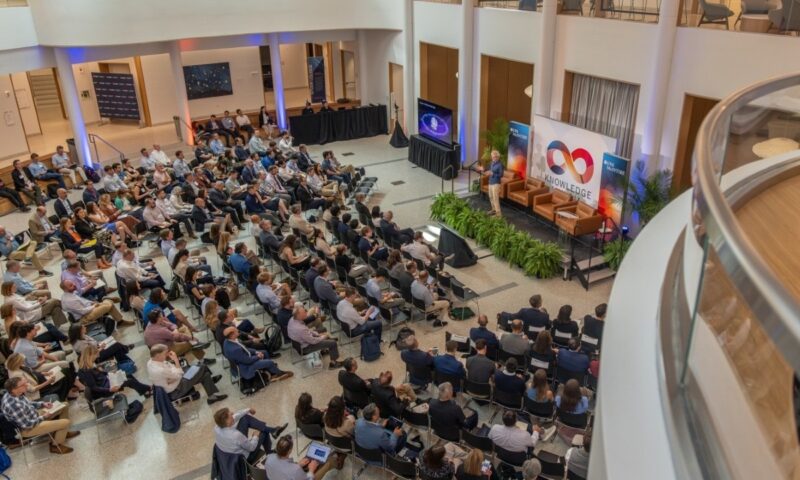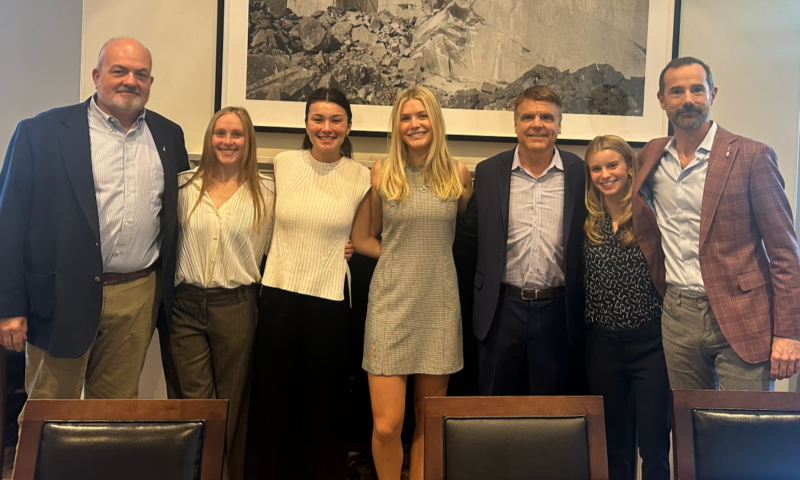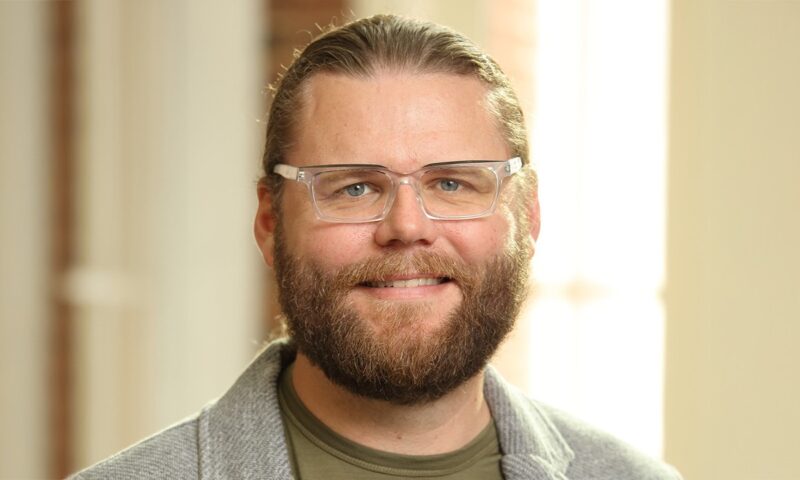UVA McIntire has long prided itself on being globally minded. Demonstrated by the coursework at the undergraduate and graduate levels; its strong international networks of academic partners, alumni, and industry; as well as the development of on-location study-abroad programs across the globe, the Commerce School provides students with a robust and rigorous business education that extends beyond borders, and readies them to lead in locations around the world.
And now, with the relaunch of its M.S. in Global Commerce Program (MSGC), McIntire is offering an unmatched global learning experience in partnership with leading European business school ESMT Berlin beginning in fall 2025.
 MSGC Director and Commerce Professor Jim Burroughs explains that, as the dynamic nature of globalization shapes business at every level—internationally, regionally, nationally, and locally—pursuing this innovative program is extremely important to the McIntire School and its students, as it addresses a vital area of commerce education and practice.
MSGC Director and Commerce Professor Jim Burroughs explains that, as the dynamic nature of globalization shapes business at every level—internationally, regionally, nationally, and locally—pursuing this innovative program is extremely important to the McIntire School and its students, as it addresses a vital area of commerce education and practice.
Though travel restrictions caused by the pandemic had temporarily halted the program, this refreshed iteration of MSGC unites a blended and diverse group of graduate students from McIntire and ESMT. The immersive graduate program will ready them for the challenges of the workforce as they gain critical global business experiences in multiple locations over the course of nine impactful months.
“This is a live-and-learn program,” says Burroughs. “It’s fundamentally structured to be all-encompassing, and so in addition to the extensive academic component, there is also a very large experiential component.” In many ways, the idea of having students constantly interacting with and learning from a diverse set of peers is as important as the academic subjects, he says, a goal that has oriented the faculty to think holistically about the program.
An Innovative Partner, a Thrilling City of Opportunity
 In rethinking the program during its hiatus, Commerce Professor Amanda Cowen, Senior Associate Dean for Academic Programs, organized a working group of faculty and staff to assess where the MSGC stood and began exploring potential partnership options. She credits Executive Director of Global Strategy and Professor Peter Maillet for identifying, meeting, and vetting potential international partners for the program before the group decided on ESMT.
In rethinking the program during its hiatus, Commerce Professor Amanda Cowen, Senior Associate Dean for Academic Programs, organized a working group of faculty and staff to assess where the MSGC stood and began exploring potential partnership options. She credits Executive Director of Global Strategy and Professor Peter Maillet for identifying, meeting, and vetting potential international partners for the program before the group decided on ESMT.
“ESMT has a culture and a program that are a really good fit with McIntire’s philosophy,” says Cowen, pointing to the Berlin-based partner’s small portfolio of high-quality graduate programs. “They really place tremendous value on the student experience, both inside and outside of the classroom,” which also includes the benefits the school offers as a result of being established in Berlin, she says.
“They’re located in a dynamic center in Europe, with Germany being a very important player in the EU economy and EU politics,” she says, noting that students will have a clear edge in the job market that will come from studying, living, and networking in the heart of Berlin, a hotbed of European innovation (representing a 20% chunk of the country’s total startups), as well as from its long-held reputation as an international cultural leader. “There are a lot of exciting enterprises around the school and that ESMT leverages in its research and curriculum.”
Cowen conveys that, like McIntire, ESMT is also very innovative. “Their ability to offer these high-impact, global experiences is of tremendous value to the program and really resonated with what we wanted to achieve in new program structure,” she says adding, “This program has the same priority to them that it does to us.”
 Maillet shares Cowen’s assessment, adding that a compelling comparison between the two schools made for a great match.
Maillet shares Cowen’s assessment, adding that a compelling comparison between the two schools made for a great match.
“There’s an obvious similarity in the relative sizes of McIntire and ESMT, but there’s also a really strong cultural common ground between the two schools. It was instantly apparent the very first time we met that we were very much on the same page in terms of how we see education and educational outcomes, but also on work styles and teams meshing effectively,” he says. “They’re a remarkable institution and even more remarkable group of people. We feel very fortunate.”
Exploring Academics
Of course, the students stand to benefit most from this new, strong partnership.
In September 2025, when MSGC students begin the program on UVA’s Grounds in Charlottesville, VA, they will take a deep dive to examine the current state of global business, the challenges multinational organizations face, and the realities of the marketplace. Throughout the fall semester, students’ Global Core coursework will explore fundamental challenges facing international business and how they might be addressed sustainably. Their classes will also develop skills in global strategy, finance, digital marketing, and emerging technologies such as AI.
Likewise, during the fall, they will take courses in consulting and project management as the first steps of the Social Impact Project (SIP), a unique capstone opportunity where student groups act as management consultants for organizations in a multitude of industries and locations across the globe.
The SIP curation process will begin in November, with students forming teams and identifying and researching potential projects. “It’s actually a nine-month experience because while they’re here at McIntire, they’re also taking their consulting classes, their project management classes, and others,” says Cowen. “All of those professional skills courses are building that foundation for them to conceptualize and eventually execute a successful project.”
While at UVA, students will have the full collegiate experience, such as attending a UVA Football game and tailgate party; accessing a full schedule of engaging School-wide events and programming; visiting UNESCO World Heritage Site Thomas Jefferson’s Monticello, going on a study trip to nearby Washington, DC; and choosing from multiple travel opportunities during school breaks.
In January, students will head to Berlin, where they will further develop their professional skills through further coursework, seminars, and cross-cultural, hands-on experiences—culminating in the completion of the SIP in a third location of their choice. As the winter gives way to spring at ESMT, they will continue honing their skills and preparing for the SIP with courses in social entrepreneurship and impact consulting, as well as important classes in operations, global supply chain management, negotiations, and more.
Cowen believes that by developing and applying these abilities in support of an organization that connects directly to their interests, the SIP proves empowering: “Here, students can customize the experience to reflect what they’re passionate about or a certain place in the world where they want to gain knowledge. They can use this project as a way to gain that experience.”
Beyond offering avenues to enact real-world initiatives through a socially minded consulting engagement, the SIP also gives student groups an exciting opportunity to work “practically anywhere in the world,” says Maillet. “It’s different to everything else we do in global student experiences, because these projects will be designed by the students themselves. They will be responsible for conceptualizing a project, effectively pitching that to their colleagues, and enticing other like-minded classmates who also find it intriguing.”
He notes that in contrast to other McIntire programs that are typically faculty led, students will be completing fieldwork for the SIPs, while being carefully guided and curated at a distance. “Managing ambiguity and complex problem-solving are what differentiates the SIP from other McIntire global initiatives,” he says.
Because of McIntire’s large and engaged global alumni and parent network, Maillet points out that there will be opportunities for members of the international and U.S.-based Commerce community to become involved in helping to develop and support several project ideas. (If you are interested in learning more, please contact Darci Spuck, Director of Global Advancement, at dds6w@virginia.edu.)
Taking an Uncommon Road to Commerce
With such an incredible experiential, career-advancing, globally oriented graduate program, it only seems fair to ask: Who exactly is the MSGC for?
Maillet believes that students with different goals will fit the bill.
As many are likely to be those interested in a global career, the opportunity that MSGC offers to study on Grounds, in Europe, and then in a third location for the SIP is inviting, made all the more impactful by collaboration with an international student cohort. It supports a future of working capably with different kinds of people from anywhere. “So much of being successful in a global context requires not only knowledge of the world and the ability to move around in it, but also the ability to work effectively with diverse groups,” says Maillet. “A hallmark of this program is its focus on teamwork. That’s going to really serve students well.”
Maillet envisions that the program’s significant social impact component will attract students who are thinking about pursuing a business career that not only achieves personal career objectives, but also allows them to do good for society in a range of areas.
He also believes that the program is a fit for students who may hope to pursue a more traditional career in the U.S. “The program sets them up for success as well, because it focuses on many of the characteristics that employers are looking for,” says Maillet. “Employers typically value candidates who are comfortable taking on a bit of risk. They like candidates who know how to deal with ambiguity, work with people who are unlike them, and roll with something when it may not go exactly to plan, as may occur in the social impact component of this course,” he says,
Cowen agrees, especially regarding the curriculum’s adaptability to the real world: “This idea of structuring complex problems, solving them, and working with others applies in many places. The program creates a series of in-class and project-based experiences that will allow students to credibly demonstrate their abilities and differentiate themselves in the job market.”
For Burroughs, the MSGC also has appeal to students with interest that extend beyond business. “The program has an edge because it takes someone who is willing to savor the opportunity to enhance and maximize their educational experience at this point in their life,” he says “They are going to do what is important to them, and more often than not, when you’re doing what’s important to you, you end up doing something that’s really important to the world,” Burroughs says, stating that includes students who may be more open to considering nontraditional careers, such as a position with a think tank, an NGO, or government.
His past work with the program tells him that students with the drive to lead and who are shaped by an innate curiosity will find that the MSGC provides the tools and inimitable experiences to expand their horizons and succeed in a range of possible careers: “That willingness to take the road less traveled will manifest in very positive ways when they move into positions to make decisions and an impact on their organizations and society.”



